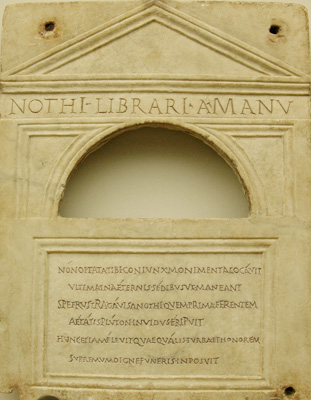
Marble loculus cover, 1st century CE

The wife of the scribe Nothus dedicated this unusual marble cover, elegantly carved in rustic capitals and no doubt expensive, for her husband's loculus, a burial niche in a communal vault. She placed the cinerary urn containing his ashes in the columbarium on the Esquiline Hill where the wealthy families of the noble gens Statilia established an above-ground repository for their deceased slaves, freedmen, and dependents in the early Julio-Claudian period. That the couple were not slaves can be deduced from her claim to the title coniunx, as marriage was only possible under Roman law for free persons. It is likely that they were freedpersons, since otherwise Nothus would bear the triple name of the freeborn citizen. Although freedpersons customarily used the first two names of their former master before their own name, freed slaves could and did use only their cognomen. Unless her name is cleverly disguised as a word in the poem (Optata), coniunx is the only name this woman chose to record on her husband's burial plaque. It may have been a title she recently or only with difficulty had attained, a sign of her improved status as a freedwoman of a gens with imperial connections and the identity that she shared with elite matronae. While the epitaph expresses her deep loss and regret for her husband's premature death, her voice is distanced by being written in the third person. It is doubtful that she would have had the training to write poetry even if she were literate, given her former life as a slave. It is probable that a professional was hired, as was often the case, by her or by Nothus' associates in a funerary collegium (burial club), to compose to specification this six-line poem in elegiac meter.
1 NON OPTATA TIBI CONIVNX MONIMENTA LOCAVIT
VLTIMA IN AETERNIS SEDIBVS VT MANEANT.
SPE FRVSTRA GAVISA NOTHI QVEM PRIMA FERENTEM
AETATIS PLVTON INVIDVS ERIPVIT.
5 HUNC ETIAM FLEVIT QVAEQVALIS TVRBA ET HONOREM
Click on the underlined words for translation aids and commentary, which will appear in a small window. Click on the icon link
![]() to the right of the line for related images.
to the right of the line for related images.